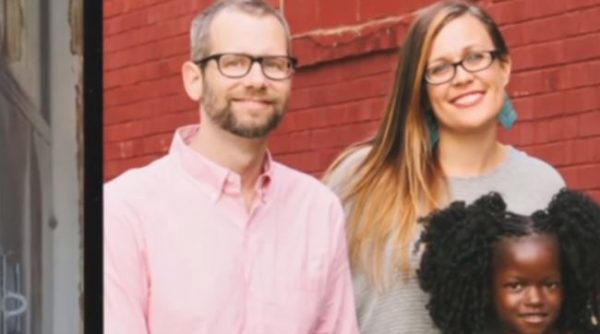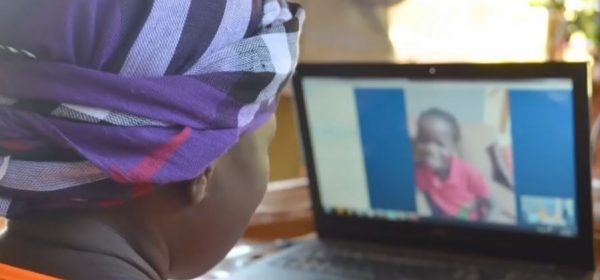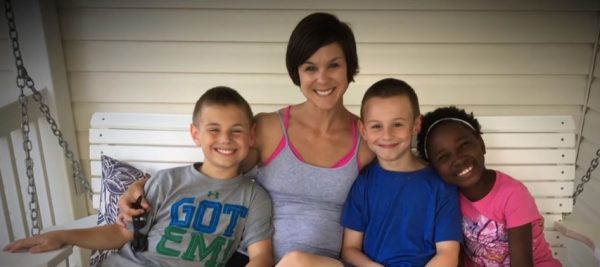Loving family adopts Ugandan orphan girl. But what she reveals when she learns English is horrifying

Jessica Davis and her husband Adam had a loving family in Ohio with four children—but they had such a will to create love and healing in the world that they wanted to open their home to more.
They decided that adoption would be one way to do this, to make a difference for even just one child living in a world “inundated with loss, hardship, and a vast array of obstacles” could bring some “goodness, peace, or healing to [the] world,” Jessica wrote.
The Davises did not make the decision lightly; they knew it would be a lot of work to support another child not just financially but emotionally, but they wanted to do this. They had done their research on adoption, domestically and internationally.
They remembered reading Uganda was one of the highest need countries, with almost 3 million orphans.
So they opened their hearts and home to a little orphaned girl from Uganda named Namata, whom they nicknamed Mata. It was a long and difficult process to ensure an above-board and ethical adoption. That meant stacks of paperwork, nearly $65,000 of expenses in total, and a year of formalities before they were able to meet their child.
Nothing about it was easy, and it was a long and arduous ordeal just to bring the 6-year-old home.

In 2015, Namata finally joined their family.
But, “nothing could’ve prepared me for what happened next,” Jessica shared in an opinion piece.
The bright and loving little girl quickly learned English, and once she did, she started telling the Davises stories about her life and home. It was starkly different from what they thought they knew.

The Davises were told that Namata was an orphan—there was no father in the picture and the mother was alive but neglectful; she was unfit and unable to take care of the little girl, who became a ward of a local orphanage.
They were told she was abused and abandoned, never taken to school and rarely given food, and this story had been told so sincerely over the phone that it was seared into the Davises’ memories.
At first, it broke Jessica’s heart to think that Namata had made up a “life before” in her mind to cope with the trauma.
“But I came to realize that she was telling me something vastly different—and vastly more important,” Jessica wrote. In 2015, they had even flown to Uganda to see Namata, and visited her at God’s Mercy Orphanage, where they saw a little girl in a stark room with no toys and bars on the walls.
But she started speaking in English, Namata would say things like her mother was a really good mother who loved her, and that she walked her to school every single day.
The Davises pored over the paperwork provided to them for some clue, and realized things were not adding up.
“Everything … she unraveled to be a lie,” Jessica said.
As she told CNN, She then realized that “the child we had struggled for years to adopt was not an orphan at all.”
They had been lied to.
“The only trauma this child ever experienced was because we essentially placed an order for a child. She was home and happy with her mother, until they selected her for us,” Adam told CNN.
Meanwhile, Namata’s mother had believed her young daughter was being sent to school abroad.
She had been approached with an opportunity to provide a great education for her daughter, and had no idea she was signing away her rights as a parent.
The Davises were horrified to realize that “we had somehow participated in taking a child from a loving family,” Jessica said. But once they knew what was going on, they sought to remedy it. The Davises worked to arrange a reunion between Namata and her mother, first setting up a Facetime call.
When they told Namata she could get to speak to her mother again, the young girl burst into giggles, all smiles, so happy because “I get to talk to my mother again!”


And Namata’s mother revealed how she was deceived into giving up her daughter, and how she was told the Davises would just be sponsoring her daughter’s education in America for a year or two.
Keren Riley, an advocate working on projects to reunite Ugandan children with their families, told CNN that there are actually several organizations who prey on families struggling in some way—maybe it’s a single mother, or they have more children than they can comfortably provide for.
“It’s easy to pull the wool over their eyes,” Riley said.
They might approach the mother at a local village church, telling them about this wonderful education opportunity, before getting them to sign all sorts of permission forms, and falsifying documents on top of it, so that the children end up adopted by families willing to shell out thousands upon thousands of dollars to fly these kids overseas.
“I don’t want to see another mother go through this,” Jessica told CNN, sharing her full story.
According to CNN, these children are essentially sold to unsuspecting families for about $15,000.

The couple had worked with European Adoption Consultants (EAC)—which is now under investigation from the State Department and FBI. The Davises know they were duped, but it is unclear whether the EAC played a knowing part in this child trafficking scheme or whether they were scammed by the local Ugandan orphanages.
Since 1990, the agency has placed over 2,000 overseas children into US homes, and it has now been disbarred, according to CNN, because it had not ensured that its foreign providers did not engage in the “sale, abduction, exploitation or trafficking of children.” Even if the agency had not knowingly participated in trafficking, they were determined to be grossly negligent and had not complied with the strict standards and procedures for international adoption.
This meant that the nightmare the Davises suffered is not a unique case.

Stacey Wells, from West Virginia, also dealt with EAC, who told her about a little girl named Violah who had been completely abandoned by her parents. “That after the dad died, [EAC] told us that [the mother] didn’t feed them, that they were found sick, dying basically,” Wells told CNN.
Her heart went out to this little girl who had suffered so much but had kept her smile, and after an arduous and expensive adoption process, the Wellses were able to bring her home from Uganda to West Virginia.
But as Violah learned English—the stories EAC spun fell apart. She would talk affectionately about her experience at home, with a mother and sisters who loved her.
Horrified when she realized the truth, Wells traveled back to Uganda with Violah so she could reunite the family that she had unknowingly broken apart.
“It was very hard—I realized at that moment, she felt like my daughter, and she still does,” Wells said. “But I knew, that she was where she was meant to be.”


0 Comments:
Post a Comment
Subscribe to Post Comments [Atom]
<< Home